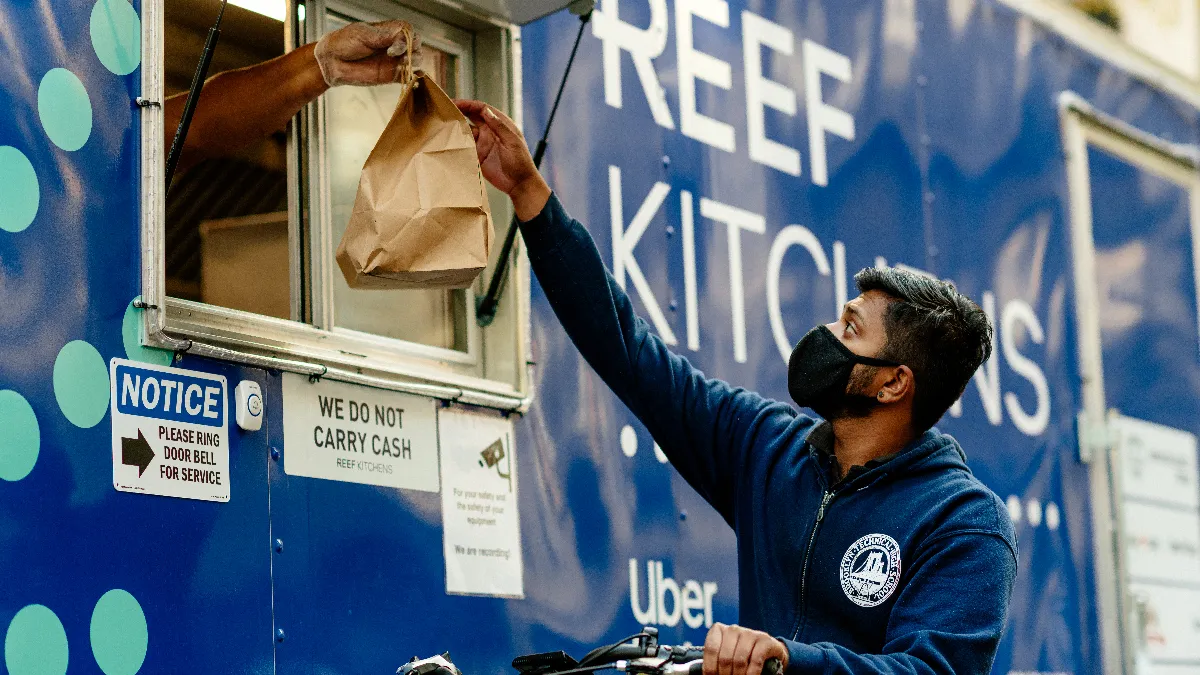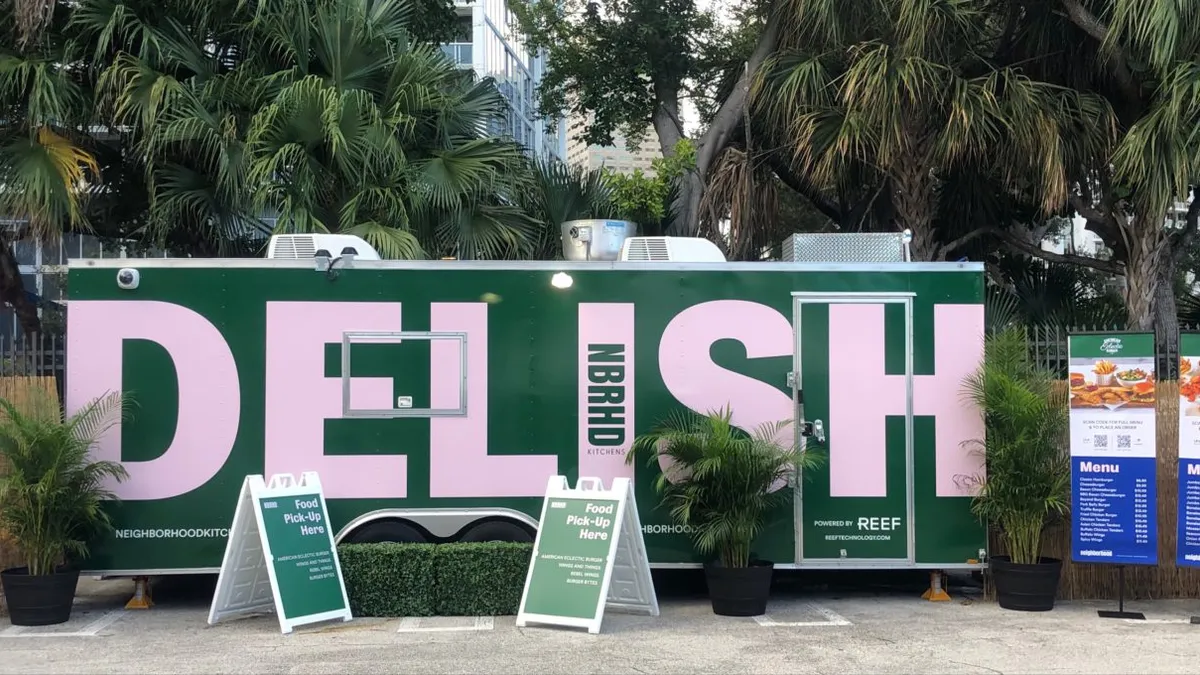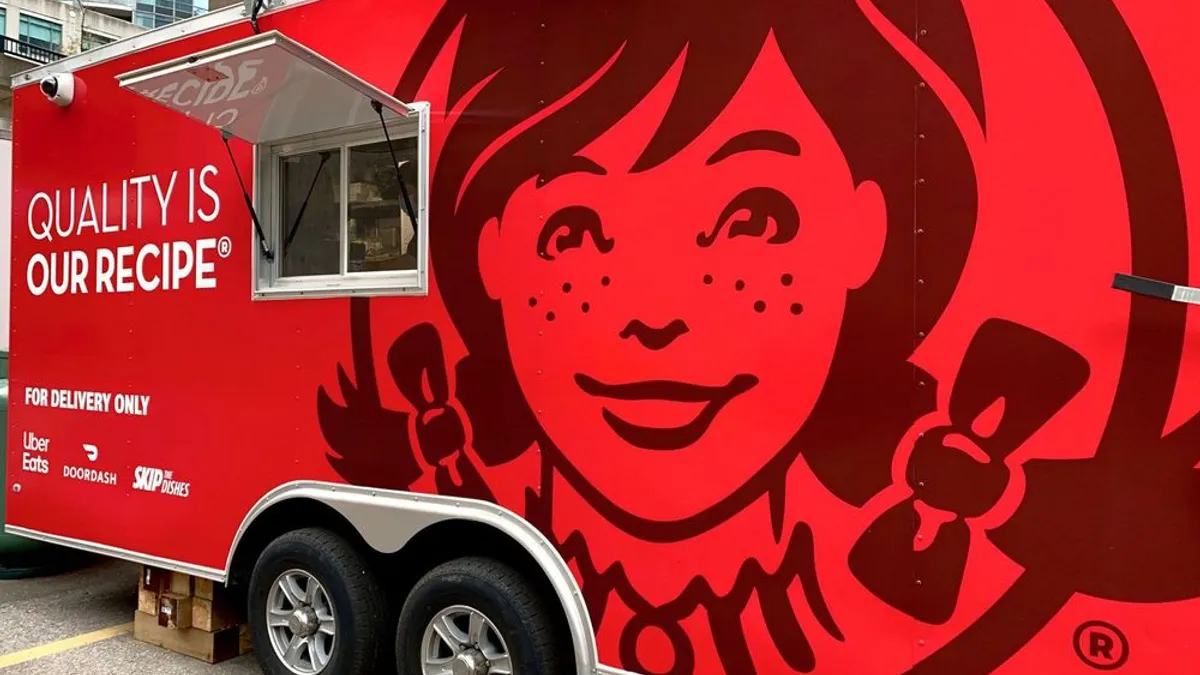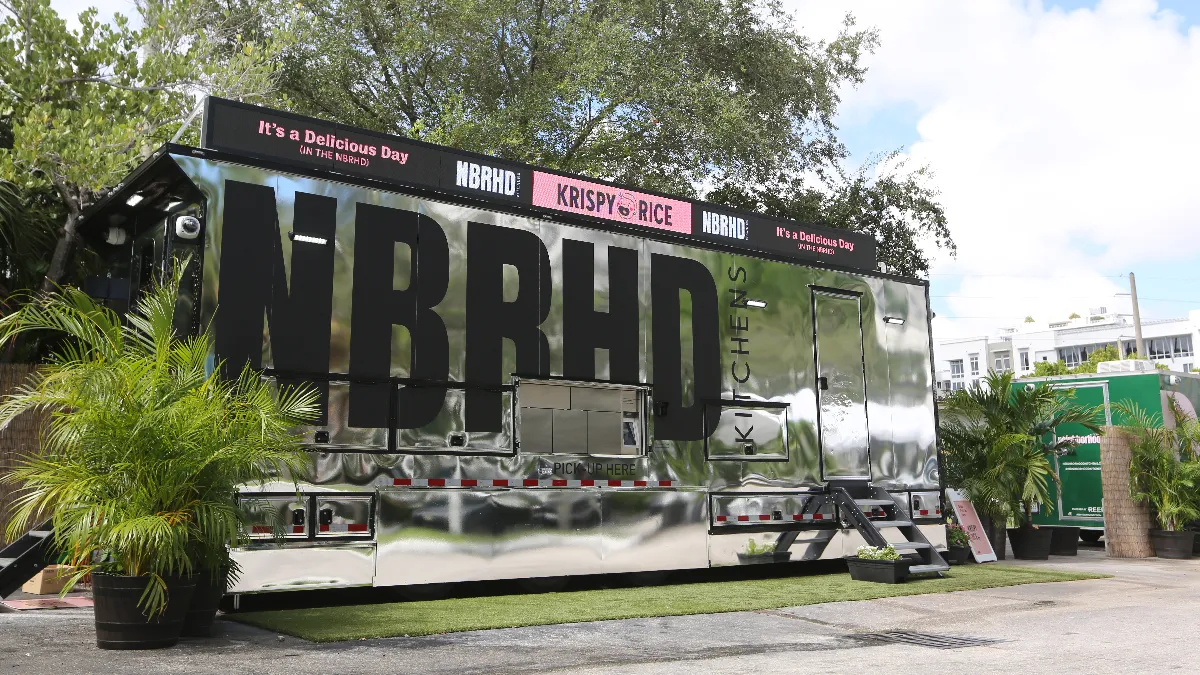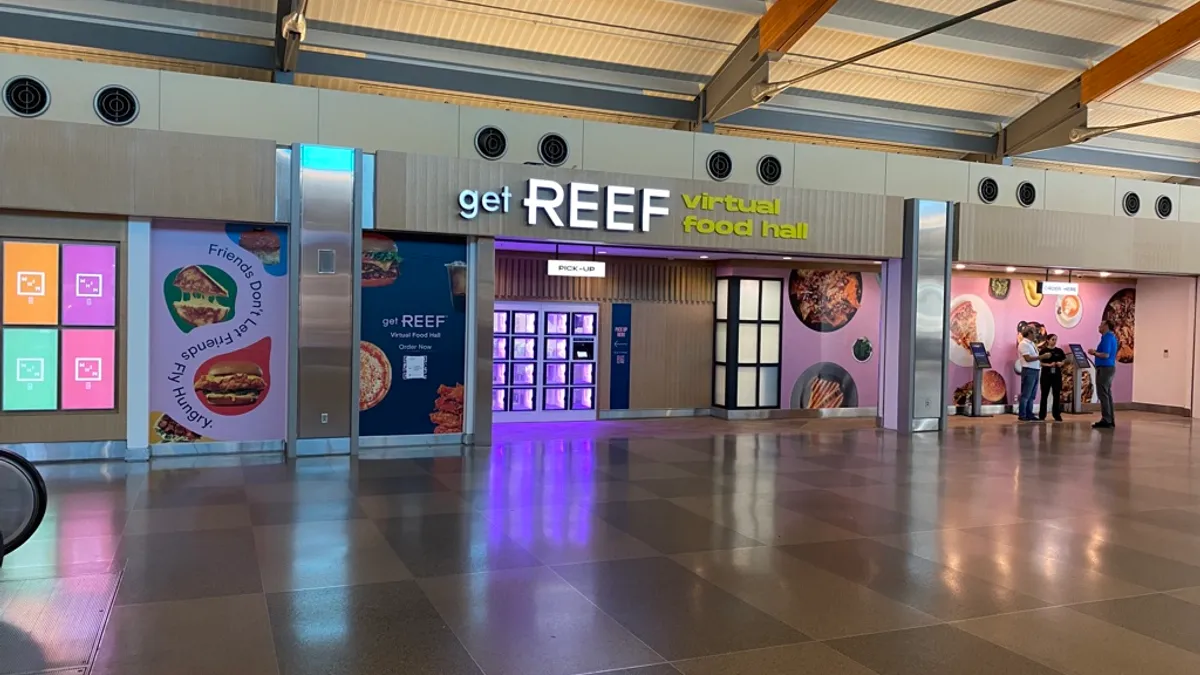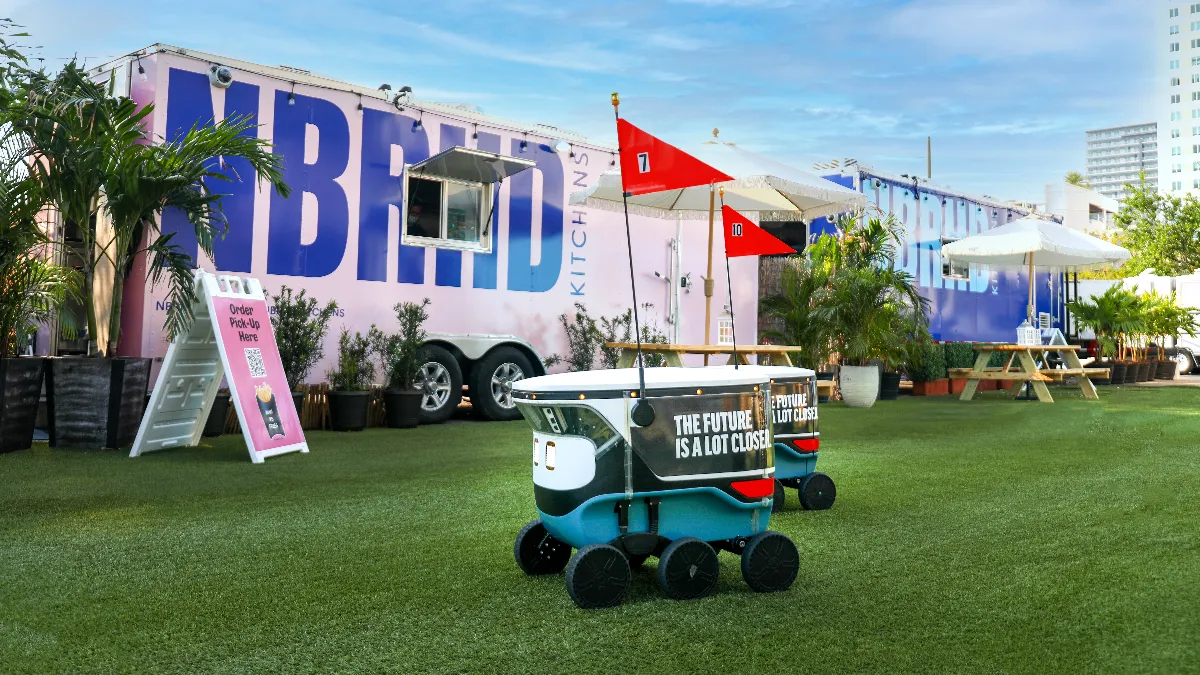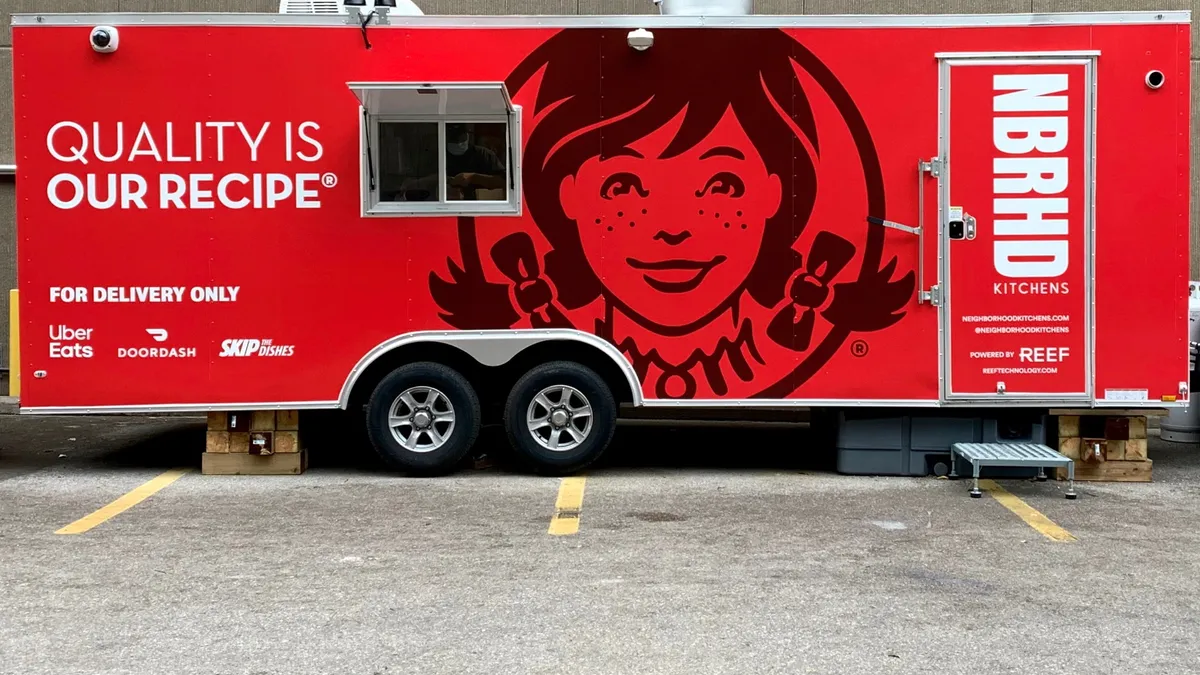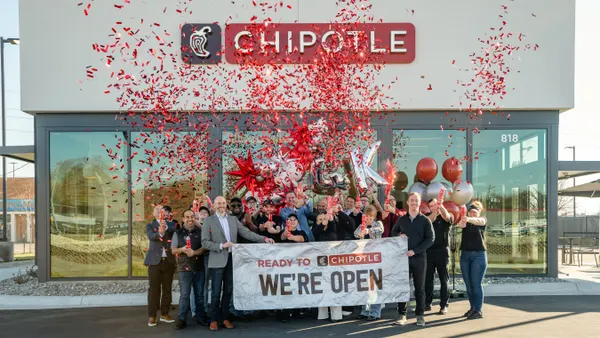Reef Technology has emerged as a leader in the growing ghost kitchen segment. But in its home state of Florida, most of its mobile kitchens have violated health and safety laws.
The trouble doesn't end in the Sunshine State, either. Regulators across the country are scrutinizing Reef's practices, resulting in closures in several of the company's biggest markets — a pattern that has disrupted business and stopped sales at units just as Reef signed a spate of major expansion deals.
Restaurant Dive found that out of 61 Reef kitchens operating with active or delinquent licenses and inspected by the Florida Department of Business and Professional Regulation, 58 violated health and safety rules. Florida DBPR categorizes violations based on their likelihood to lead to foodborne illness. A high priority violation could directly lead to illness, while an intermediate violation could, if unaddressed, contribute to one in the future. Twenty-one kitchens racked up high-level safety violations — two of which were forced to temporarily close — while 23 had intermediate violations.
These infractions range from units that lacked soap and running water at handwashing sinks to locations that stored meat at dangerously high temperatures. Florida inspection records show, for example, that fish offered at one Reef unit was "offered raw or undercooked" and had not "undergone proper parasite destruction." Florida inspectors issued a stop sale order on that fish on Nov. 17, 2020.
The two units that were forced to temporarily shutter allowed sewage to leak into kitchens.
On Oct. 25, inspectors at one location "observed sewage backing up from the three compartment sink and spilling on the floor of the mobile unit as a result of a full waste tank." The second unit was found to be similarly contaminated on Oct. 25, and its certified food manager also failed to provide notice that an employee had been diagnosed with a foodborne illness.
Reef declined to comment on the closure of any of its units for health violations. The company's own record of its Florida kitchens also contradicts the state's documentation. A Reef spokesperson said Reef operates 43 kitchens in the Sunshine State, compared to Florida's license and inspection records which show at least 61 Reef kitchens as of Nov. 1.
The spokesperson argued, however, that the company's health and safety record was comparable to or better than other restaurant operators. Reef also said that all of its employees undergo proper training and certification prior to working in Reef kitchens. According to the DBPR, just under one fifth of restaurant violations in Florida are high priority, and just under a quarter are intermediate priority violations.
But new reports of unsafe conditions at Reef kitchens in other states have cropped up just this week. The Wall Street Journal reported Monday that utility hookup delays and propane explosions plague Reef units in Houston. Former Reef employees corroborated WSJ's fireball accounts with Business Insider, and said the company served undercooked food and many units ran out of water for dishwashing and handwashing. These details support the allegations uncovered by Restaurant Dive's analysis of Florida public records.
Restaurant Dive found evidence of similar malpractice at Reef's Chicago locations, as well.
Out of 12 Reef kitchens in Chicago, all had recorded violations, and six outright failed inspections.
Business Insider reported those failed inspections resulted in unit closures. Like Houston and Florida, units lacked adequate hot water at handwashing sinks and refrigerated drawers were too warm. In one instance, Chicago inspectors found water dripping from a wastewater tank; in another, the manager was unable to provide a food manager's certificate.
Reef says its business model doesn't always fit with regulations
In other cities, including New York City and Houston, Reef has been forced to close units over what it described to Restaurant Dive as permitting issues. The company said it encountered permitting issues in New York City because its vessels are neither food trucks nor brick-and-mortar stores, making them difficult to fit into existing permitting structures. The New York City Department of Health and Mental Hygiene told Business Insider, however, that Reef had violated other health and safety laws in the city.
Reef's growing list of violations reflect concerns over how to regulate the rapidly growing ghost kitchen market.
Earlier this year, before Business Insider first reported on Reef kitchen closures in New York, President of Reef Kitchens and Retail Michael Beacham told Restaurant Dive Reef's business model doesn't always fit within existing regulations. He emphasized, though, that Reef works with local governments before opening units.
"We go in advance and sit down and say, 'Hey, here's what we plan to do,'" Beacham said. "We invite scrutiny. So we ask them in advance to say, 'How do you want us to operate those locations that you feel good about, and the ones that you don't [feel good about], what do we need to do to give you the confidence we're going to put public safety first?'"
Beacham claimed Reef's proactive attempts to operate within local regulatory frameworks stands out from unnamed rivals' strategies.
"There are companies that will go out there, and they will look for the gray area of the law," Beacham said. "Especially since it's a new industry. And it's a new way of doing things … a lot of times regulations [aren't] caught up to what we're doing."
Reef remains poised for major expansions
Reef's growth has skyrocketed despite this approach and its operational struggles.
Between August and November 2021, Reef Kitchens announced deals to open at least 2,300 ghost kitchens within five years, which would increase its unit count fivefold. This rapid expansion has made Reef one of the biggest ghost kitchen operators in the United States.
Reef, which is also North America's largest parking lot operator, leverages its parent company's real estate to bolster its network of delivery-focused kitchens. Beacham said Reef has unique access to a sizable market given the company's existing parking lot business.
"Throughout the United States and Canada, we're within five minutes of 70% of the urban population," Beacham said.
Reef, Beacham said, offers chains like Olive Garden and TGI Fridays — the latter of which recently signed a deal to open 300 Reef ghost kitchens — a chance to expand into markets where they have high brand recognition, but few locations.
Peter Saleh, a managing director and restaurant and food distribution analyst for BTIG, said the ghost kitchen model made it easier for brands to enter expensive markets for relatively little capital. But smaller facilities that serve fewer brands, like Reef's trailer-sized kitchens, might not be as appealing to customers as bigger operations which can serve 10 or 20 brands, he said.
"I feel like where the real value is, is in being able to mix and match under one check, and have that build up to the customer, and get desserts and side items and the best of all the major brands," Saleh said.
But Reef's model offers savings on capital, operating and labor costs, Saleh said, which could be attractive to brands regardless of their size.
Beacham said his company's focus on dense markets gives it a leg up on competitors, especially as food quality degrades the longer a delivery takes.
"We place our locations in [the] closest proximity to where people work and live as possible," Beacham said. "We can deliver it faster, we can deliver it cheaper and better than others."
A ghost kitchen's size and limited channels can cap sales lower than what a traditional QSR location could accrue, according to Saleh. Wendy's, which has partnered with Reef to open 700 ghost kitchens by 2025, has given some estimates of expected sales in recent earnings calls.
"We're expecting the sales in the range of $500,000 to $1 million per unit," Todd Penegor, Wendy's president and CEO, said on the company's Q2 earnings call in August. According to Wendy's 10-K for 2020, annual average unit volume was about $1,725,000 in the United States, though international stores had a lower volume, bringing the company's global AUV down to about $1,654,700.
A Reef spokesperson says, however, that the company's highest performing units generate sales comparable to brick-and-mortar locations. But The Wall Street Journal reports that daily costs at Reef kitchens top $1,800 a day, while the average kitchen brings in about $1,250 in revenue, which could be a problem for Reef even if franchisors see a boon from franchising fees.
Still, Reef offers Wendy's access to urban markets and low capital costs, and the ghost kitchen platform will pay Wendy's a higher-than-average royalty rate, Penegor said on the Q2 earnings call.
"We've got a higher royalty rate, in the U.S. almost 6%, 5.5% in the U.K. So even though there's a little bit lower sales dollars coming out of those [Reef] vessels, we got a nice, healthy economic return," Penegor said.
Wendy's franchising agreements generally have a 4% royalty rate, according to Saleh. It's unclear how Reef contributes to other partner costs, however, such as national marketing spending, Saleh said.
Smaller and emerging brands have also bet big on Beacham's promise of top-tier speed at the lowest cost available. Nathan's Famous partnered with the company last year, and 16-unit 800 Degrees Pizza signed a deal with Reef to open 500 ghost kitchens in the United States and the United Kingdom over the next 5 years. C3, a company focused primarily on virtual brands and ghost kitchens, will roll out its brands at 800 Reef kitchens.
Reef has also raised considerable amounts of money. In 2019, Reef Technology raised $700 million to power its expansion worldwide. That fundraising was led by Softbank and Mubadala, a sovereign wealth fund associated with Mohammed bin Zayed, the crown prince of Abu Dhabi and deputy commander of the United Arab Emirates' military. In 2021, Reef acquired iKcon, a ghost kitchen company based in the UAE.
So far, Reef's regulatory issues don't seem to have shaken investor or brand confidence in the company. Other tech-heavy service firms, like Uber and Lyft, expanded dramatically while flouting regulations. Only once they were established did those companies pressure governments to change regulations to suit their business models. Years later, courts, regulators and local authorities have now begun to seriously limit the power of rideshare and delivery companies. Given that the ghost kitchen segment is still in its early stages, it's possible Reef, with its considerable capital and strong brand deals, could continue its expansion without major regulatory problems.



